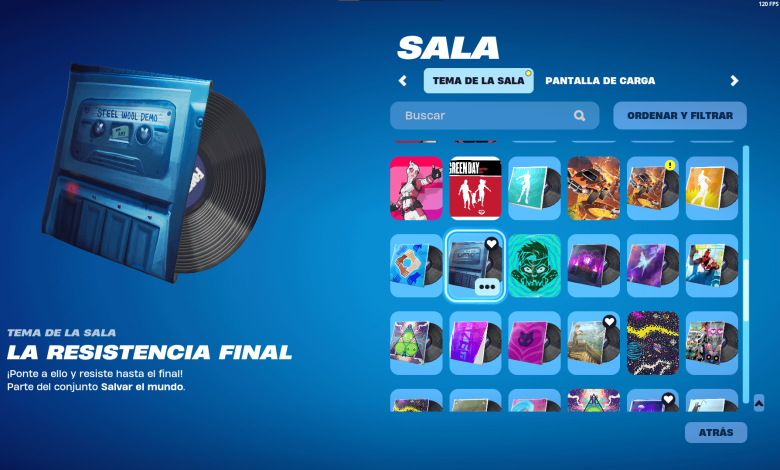Can you make this into Fortnite Festival? pretty pleaseee


Nuevo invento: Fortnite Festival, el evento que revolucionará el mundo gamer
¡Atención todos los gamers y fans de Fortnite! Un nuevo e increíble invento está por llegar: el Fortnite Festival. Este evento promete ser una experiencia única e inolvidable para todos los amantes de este popular videojuego de batalla real.

¿Qué es el Fortnite Festival?
El Fortnite Festival es un evento en vivo que combinara la emoción del videojuego con la adrenalina de una experiencia presencial. Los participantes podrán disfrutar de torneos, encuentros con sus streamers favoritos, sorteos de objetos exclusivos y mucho más.
Características destacadas del Fortnite Festival
- Torneos presenciales: Los jugadores podrán demostrar sus habilidades en competencias cara a cara.
- Meet & Greet con streamers: Oportunidad única para conocer a tus referentes del mundo gamer.
- Zona de juegos y experiencias interactivas: Diversión asegurada con actividades y atracciones temáticas de Fortnite.
- Sorteos y premios exclusivos: Objetos y merchandising único del evento.
¿Cómo participar en el Fortnite Festival?
Para ser parte de este innovador evento, los interesados deberán registrarse en el sitio web oficial del Fortnite Festival y adquirir sus entradas. ¡Cupos limitados!
No te pierdas la oportunidad de vivir una experiencia única en el mundo gamer. ¡Prepárate para el Fortnite Festival y sé parte de esta revolución!
¿Estás listo para unirte a esta increíble aventura? ¡Comparte esta noticia con tus amigos y sé parte de la comunidad Fortnite!
Etiquetas SEO: Fortnite, Fortnite Festival, evento gamer, torneos presenciales, meet & greet, streamers, experiencias interactivas, sorteos, premios exclusivos, mundo gamer, gaming, videojuegos, batalla real, comunidad Fortnite.

Can you make this into Fortnite Festival? pretty pleaseee
[matched_content]
Here are some common social SEO tags that can be added to a website’s HTML:
-
Open Graph (OG) tags:
- og:title: The title of the content (e.g.,
<meta property="og:title" content="Page Title">) - og:description: A brief description of the content (e.g.,
<meta property="og:description" content="Page description">) - og:image: The URL of an image that represents the content (e.g.,
<meta property="og:image" content="https://example.com/image.jpg">) - og:url: The canonical URL of the content (e.g.,
<meta property="og:url" content="https://example.com/page">) - og:type: The type of content (e.g., article, website, video) (e.g.,
<meta property="og:type" content="article">) - og:site_name: The name of the website (e.g.,
<meta property="og:site_name" content="Example Site">)
- og:title: The title of the content (e.g.,
-
Twitter Card tags:
- twitter:card: The type of card (e.g., summary, summary_large_image) (e.g.,
<meta name="twitter:card" content="summary_large_image">) - twitter:title: The title of the content (e.g.,
<meta name="twitter:title" content="Page Title">) - twitter:description: A brief description of the content (e.g.,
<meta name="twitter:description" content="Page description">) - twitter:image: The URL of an image that represents the content (e.g.,
<meta name="twitter:image" content="https://example.com/image.jpg">) - twitter:site: The Twitter handle of the website (e.g.,
<meta name="twitter:site" content="@example">) - twitter:creator: The Twitter handle of the content creator (e.g.,
<meta name="twitter:creator" content="@author">)
- twitter:card: The type of card (e.g., summary, summary_large_image) (e.g.,
-
Schema.org markup:
- Itemscope and itemtype: Define the scope and type of the content (e.g.,
<div itemscope itemtype="http://schema.org/Article">) - itemprop: Specify properties of the content (e.g.,
<h1 itemprop="headline">Article Title</h1>,<span itemprop="author">Author Name</span>,<time itemprop="datePublished" datetime="2023-06-08">June 8, 2023</time>)
- Itemscope and itemtype: Define the scope and type of the content (e.g.,
-
Dublin Core metadata:
- DC.title: The title of the content (e.g.,
<meta name="DC.title" content="Page Title">) - DC.description: A description of the content (e.g.,
<meta name="DC.description" content="Page description">) - DC.creator: The creator or author of the content (e.g.,
<meta name="DC.creator" content="Author Name">) - DC.date: The date of the content (e.g.,
<meta name="DC.date" content="2023-06-08">)
- DC.title: The title of the content (e.g.,
-
Facebook-specific tags:
- fb:app_id: The Facebook App ID associated with the website (e.g.,
<meta property="fb:app_id" content="1234567890">)
- fb:app_id: The Facebook App ID associated with the website (e.g.,
-
LinkedIn-specific tags:
- LinkedIn can use Open Graph tags for sharing content.
- Pinterest-specific tags:
- pinterest-rich-pin: Indicates that the page is eligible for Rich Pins (e.g.,
<meta name="pinterest-rich-pin" content="true">)
- pinterest-rich-pin: Indicates that the page is eligible for Rich Pins (e.g.,
These are just a few examples of social SEO tags. The specific tags you use may depend on your target social media platforms and the type of content you are sharing.
I hope they remove music packs and have everything be turned into jam tracks. I mean it won’t do anything harmful. It will just make the locker less cluttered. Also would be nice to just have it be one thing again
vocals chart on this would be weird af since the song is translated in different languages